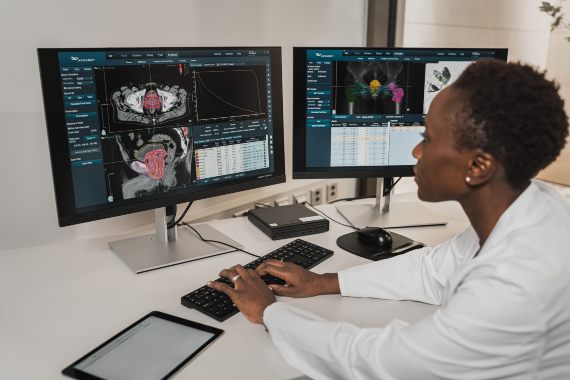If we asked the most famous artificial intelligence (AI) based chat today about the role that data analysis plays in everyday clinical practice, it would respond that it is increasingly important to help improve human health. However, even AI warns humans of how crucial it is to have scientific criteria based on healthcare professionals to ensure quality treatment, patient care and follow-up.
Artificial intelligence is a perfect ally for physicians throughout the entire healthcare process. On the one hand, it contributes to the diagnosis and early detection of diseases by analyzing large amounts of health data, such as medical history, medical images and the results from clinical tests. On the other hand, it helps to streamline processes that were an additional burden for professionals in the past. This allows doctors to focus on more important tasks like spending more time with their patients, while making their work more efficient.

The latest technological developments in artificial intelligence related to medical research look for the potential causes of diseases. For example, it focuses on helping people prevent disease and identifying a patient’s health problems in much earlier stages in order to improve their quality of life, advance treatment and greatly reduce its cost through more effective, specific medicine. Medical professionals currently have tools that help them in all areas of their work, from searching for molecules and the best foods to prevent pain and improve their patients’ quality of life to accelerating the discovery of new pharmaceuticals in clinical trials, early diagnosis, treatments adapted to comorbidities and personalized, data-based therapies.
It cannot be denied that AI is already part of healthcare in the form of valuable, essential tools for doctors. These tools help to improve people’s health, but it is important to take into account that the clinical judgment of a trained healthcare professional should never be replaced by technology. In fact, it is the human aspect that gives value to the analytical results, is familiar with the patient in their environment, their psychology and everything that in one way or another could be influencing their health and quality of life on a personal level.

In short, doctors should never lose their Hippocratic perspective toward patients. A philosophy that continues to influence the practice of modern medicine and that will continue being relevant as long as there are people looking for human, compassionate medical care. Interpersonal skills can only be developed by a trained human being. For this reason, artificial intelligence will be used as a key ally for physicians, but never as an alternative.
Comments on this publication